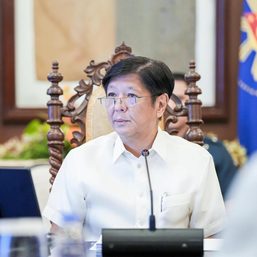SUMMARY
This is AI generated summarization, which may have errors. For context, always refer to the full article.

CAGAYAN DE ORO, Philippines – The teenage grandchildren of one of the pioneers of community journalism in Cagayan de Oro, Bienvenido “Ben” Emata Jr., are honoring him by giving back to his home province of Misamis Oriental.
Emata’s grandchildren started Chapters of Change, a project that entails the deployment of a mobile library dedicated to promoting literacy and igniting a passion for reading in underserved communities.
Most of the books in the mobile library were collected during a school book donation campaign, including those from children’s book authors in the United States.

The project was initiated by Emata’s US-based grandchildren, Arianna and Oliver Horsup, who have been regular visitors to Misamis Oriental, their grandparents’ home province.
Their late grandfather, a journalist from Balingasag, Misamis Oriental, published the Cagayan de Oro-based Mindanao Reporter during the first Marcos administration. The newspaper was shut down in 1972 due to martial law.
Emata later became editor of Ang Bag-ong Katarungan, now the longest-running weekly in Mindanao, where he faced 52 libel cases but was never convicted. He also worked as a newscaster, production manager, and commentator in Cagayan de Oro. In 1986, he launched another weekly, The Headliner, and contributed to Manila-based publications.
The Emata family moved to the US in 1989, and he worked with the Santa Clara County Assessor’s Office and eventually retired in San Jose, California.

Having traveled across Mindanao, Visayas, and Luzon, the Emata grandchildren were stunned by the children’s interest in reading, playing, and interacting despite not having access to a library.
“What initially began as an idea is now evolving into a reality. Turning pages, transforming lives – this is our story,” said Arianna, the 14-year-old president of Chapters of Change.
In an online post by the Barbara Bush Houston Literacy Foundation, Arianna’s father, David Horsup, spoke highly of his daughter and how she spent her summer vacation learning how to start a charity.
“I remember shortly after we got back, Arianna mentioned she would like to help the children in these villages. She wanted to send books over and potentially set up a library. As we discussed this as a family, we landed on the idea of setting up a mobile library service that would travel to remote villages providing them with access to books. She then decided she wanted to formalize this as a charity, so she spent her remaining summer vacation researching,” said David.

The Chapters of Change Mobile Library was launched on Thursday, June 27, at Bird’s Nest Sanctuary in Misamis Oriental.
Carl Cesar Rebuta, a Chapters of Change board member, said the mobile library was brought to a village in Pagawan in Manticao town the following day in collaboration with barangay and youth council leaders.
David said the focus of the mobile library is to improve literacy primarily among children, but it can also extend to young adults in remote communities.
He said the project aims to help families break the cycle of poverty.
“If they don’t have access to resources, it is difficult for them to learn to read and ultimately get a good education. It is difficult for them to break this cycle. Everything starts with reading, so if we can encourage learning by creating a passion for reading through giving them access to fun and quality material, we can potentially inspire their educational journey and break the cycle of poverty for their families,” David said. – Rappler.com
Add a comment
How does this make you feel?





![[OPINION] Making the important interesting: My Rappler journalism fellowship experience](https://www.rappler.com/tachyon/2024/06/wenilyn-sabilo-fellowship-june-19-2024.jpg?resize=257%2C257&crop=309px%2C0px%2C720px%2C720px)
![[OPINION] The Aries Rufo Fellowship made me feel like a real journalist](https://www.rappler.com/tachyon/2024/06/The-Aries-Rufo-Fellowship-let-me-feel-like-I-really-am-a-Journalist-1.jpg?resize=257%2C257&crop=560px%2C0px%2C720px%2C720px)

There are no comments yet. Add your comment to start the conversation.